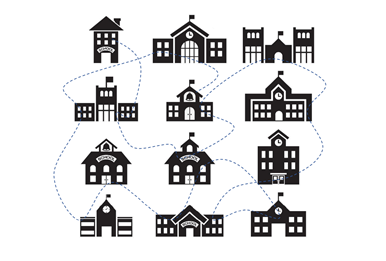By: Rachel Comly, Ryan Fink, Jill Pierce, Adrianne Flack
January 2019
Summary
Charter schools enroll about one third of all public school students in Philadelphia, and more than half of Philadelphia’s charter schools are independent – stand-alone schools managed by individual operators that are not part of a charter network. Like all charter schools, independent charter schools have inherent flexibility to innovate to meet student needs. However, educators at these schools may have fewer opportunities to learn with others about how to improve their craft. A key challenge is to maximize the benefits of being an independent charter school and minimize the drawbacks.
This study is an initial inquiry into the need and opportunity for cross-school professional learning for educators at Philadelphia charter schools. The study team interviewed teachers and leaders in early literacy instruction from six independent charter schools in Philadelphia.
The research questions are:
- What types of external resources (e.g., formal and informal collaboratives, consultants, professional associations, university programs, other schools) do Philadelphia’s independent charter school leaders and teacher leaders use to address instructional challenges and/or to learn about new approaches in K-3 literacy? What factors facilitate or constrain independent charter schools’ access to these resources?
- What types of structures or supports do independent charter school leaders and teacher leaders in Philadelphia believe would be helpful to support their schools’ early literacy programs, and what conditions would be necessary for them to use these structures or supports?
- What supports and collaboratives that involve independent charter schools exist in Philadelphia and in other cities and states?
Key Findings
-
Current resources for professional learning include informal information-sharing with teachers in other schools, professional development and conferences, and online research. Respondents from independent charter schools reported finding some, mostly informal, external resources on their own in order to provide as much support as possible to their early literacy programs. Respondents reported forming informal networks with other teachers and with past and present professors, attending professional development and conferences, and researching resources online
-
More than half of respondents reported that their schools relied more heavily on internal expertise than on resources external to the school for early literacy professional learning. The internal support came in varied forms, including through in-house literacy specialists, internal expertise built from external supports, and schools’ boards.
-
Overall, respondents were open to working with teachers and teacher leaders from other charter schools to support early literacy instruction. Respondents were eager for opportunities for teachers and teacher leaders to collaborate around early literacy instruction. They suggested that a collaborative should meet the needs of teachers and teacher leaders, providing space for them to share and hear new instructional strategies and, as one respondent put it, “grow in their craft.” Several respondents were unaware of any structured opportunities to collaborate with teachers from charter and/or traditional public schools around instructional issues.
-
Respondents were eager to join a learning collaborative with other charter school teachers and teacher leaders, as long as the collaborative met several criteria. Respondents asked that collaborative activities be sensitive to the time pressures and funding constraints of teachers and school leaders, and they said that a collaborative would need to be relevant to participating schools’ needs.
-
Some respondents believed their schools’ in-house literacy expertise was sufficient. Some respondents said that their early literacy instruction was already adequate. For this reason, some potential participants might not see the need for an instructional collaborative around early literacy.
Policy and Implications
-
Collaboration among schools may be most feasible at the teacher and teacher leader levels of the school. Reliance on informal networks, hunger for professional development experiences, and comments about professional isolation from our small sample of respondents suggest that a knowledge-sharing collaborative might fill unmet needs among early literacy leaders in independent charter schools. Although there are some examples of formal collaboratives where whole faculties engage in cross-school collaboration, given the inherent nature of an independent charter school and the cautions provided by respondents, a voluntary collaboration for independent charter school teachers and instructional leaders seems most feasible at this time.
-
Potential collaborations should have an identified instructional focus and clear goals. In interviews, respondents reported that a successful collaboration must have clear goals to improve instruction and be organized and accessible in order for charter school staff to participate. Those who are interested in facilitating this kind of collaborative should ensure that the structure meets the needs of participants, that potential participants know about the opportunity to collaborate, and that the opportunity is time- and cost-effective.

